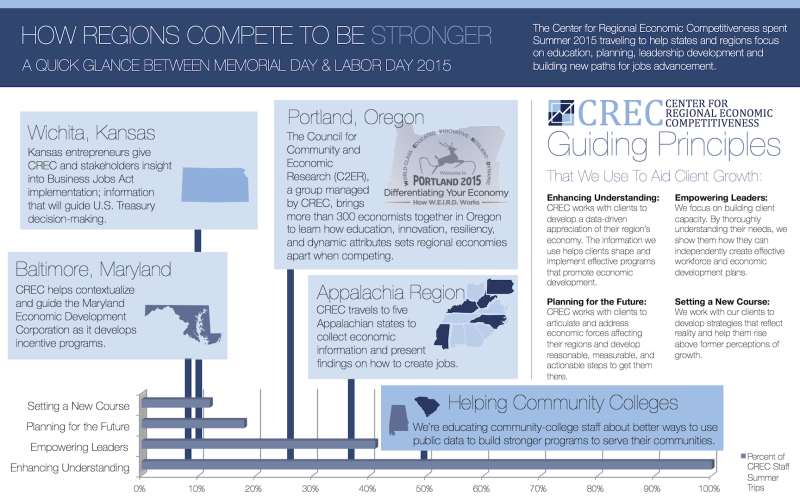
CREC Responds to Summer 2015 Clients by Using Guiding Principles
October 30, 2015
ARLINGTON, VA – The Center for Regional Economic Competitiveness (CREC), an independent nonprofit that provides policymakers with data and technical assistance to formulate and execute innovative and regional economic strategies that lead to job growth, today released findings on how its clients grew during Summer 2015 by relying on pre-determined CREC guiding principles.
Devotion to Learning:
As part of the exercise, CREC looked specifically at how it interacted in face-to-face meetings with clients between Memorial Day and Labor Day. CREC learned that 100 percent of its face-to-face summer client activity involved educating regional decision-makers about new and existing data that can help shape and implement effective programs to promote economic development.
Empowering Leaders:
Secondly, the findings also show that 40 percent of CREC’s summer client interactions were devoted to developing and empowering leaders to use proven methods that drive economic impact in their state and region. Specifically, CREC worked with leaders on the following:
- Economic and workforce development
- Economic analysis
- Labor-market assessments
- Economic policy implementation
CREC provides ongoing trainings on these topics through our partner organizations, and we invite the public to attend these sessions:
- The Council for Community and Economic Research (C2ER) trainings
- Labor Market Institute (LMI) trainings
- Association of Public Data Users (APDU) trainings
Envisioning a New Future:
Seventeen percent of the organization’s face-to-face client interactions were devoted to future planning – a process in which CREC designs a vision for the future, develops measurable and actionable steps, and then assists the customer in reaching that goal. Finally, CREC spent 11 percent of its summer face-to-face client interactions by helping state and regional decision-makers set a new course. This process is one of the most time-consuming and relationship-based because this growth process helps leaders re-envision their community’s identity and then generate a new growth perception so that the goal-making process can begin.
About CREC:
The Center for Regional Economic Competitiveness (CREC) is an independent nonprofit that provides strategic economic analysis and manages networks of data and research professionals. Our technical assistance expertise produces innovative, regional job-creating strategies. CREC achieves its mission by undertaking efforts to
- Understand the economic forces impacting regions and localities
- Assist local leaders in formulating knowledge-based strategies
- Develop transformational models that support knowledge-driven economic prosperity
CREC believes that institutions responsible for developing regional economies can be more effective in their efforts to create jobs for the knowledge economy. The Center helps these organizations achieve their goals by providing better information about regional economies and a framework for developing local consensus on strategic direction. CREC divides its work into five areas of expertise:
